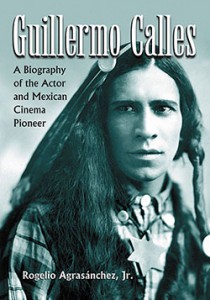Guillermo Calles
A Biography of the Actor and Mexican Cinema Pioneer


Average rating: ![]()
| 0 | rating | |
| 0 | rating | |
| 0 | rating | |
| 0 | rating |
Your rating: -
Book Presentation:
In 1912, Guillermo Calles (1893–1958) became the first Mexican actor to appear in films made in California. Despite limited resources, he began directing and producing his own movies, and in 1929 pioneered production of Spanish-language sound films. His major works, among them the long-unavailable El indio yaqui and Raza de bronce (both 1927), represented Calles’ tireless crusade to restore the image of Mexicans and Indians in an era dominated by Hollywood stereotypes.
This biography traces Calles’ career from his earliest Hollywood days through the 1950s. Included are the only surviving images of the filmmaker’s silent productions, a closing commentary on his intimate circle of relatives, and an appendix featuring two fascinating letters written by Calles during a filming trip.
About the Author:
Rogelio Agrasánchez, Jr., is director and curator of the Agrasánchez Film Archive in Harlingen, Texas, the world’s largest private collection of Mexican cinema. He is the author of several books.
Press Reviews:
"fascinating…impressive"—Aztlán: A Journal of Chicano Studies.
See the publisher website: McFarland & Co
See the complete filmography of Guillermo Calles on the website: IMDB ...
> From the same author:
Mexican Movies in the United States (2011)
A History of the Films, Theaters and Audiences, 1920–1960
> On a related topic:
Romancing Yesenia (2024)
How a Mexican Melodrama Shaped Global Popular Culture
Spectacle Every Day / Espectáculo a diario (2023)
Essays on classical Mexican cinema 1940-1969
Dir. Díaz de la Vega Alonso and Jorge Javier Negrete Camacho
(in English and Spanish)
Woman-Centered Brazilian Cinema (2023)
Filmmakers and Protagonists of the Twenty-First Century
Dir. Jack A. Draper III and Cacilda M. Rêgo
Border Witness (2023)
Reimagining the US-Mexico Borderlands through Film
by Michael Dear
Subject: Sociology
Mexico Unmanned (2022)
The Cultural Politics of Masculinity in Mexican Cinema
The Lost Cinema of Mexico (2022)
From Lucha Libre to Cine Familiar and Other Churros
Dir. Olivia Cosentino and Brian Price